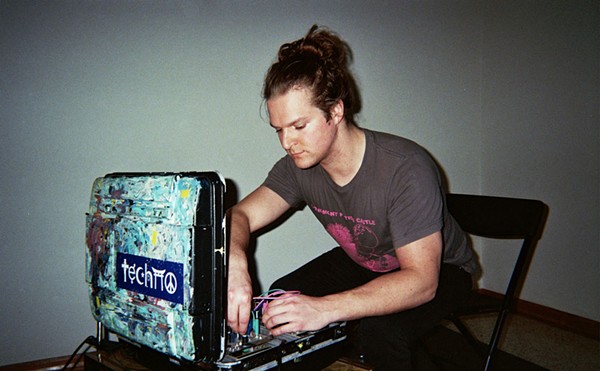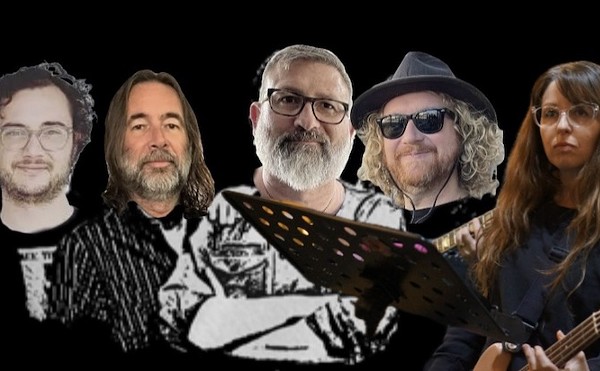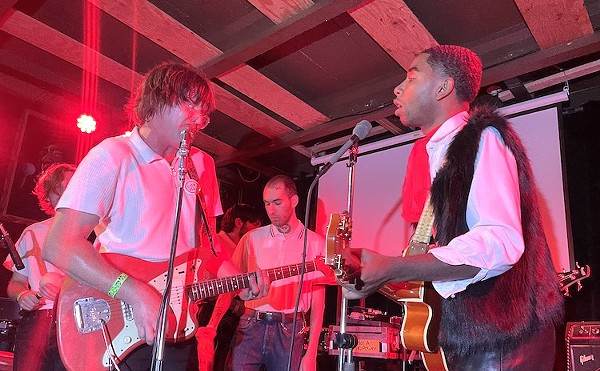Like ancient embalmers, Nile can yank brains out of earholes. This musically and intellectually intimidating outfit combines death-metal riffs with guitarist/vocalist/amateur Egyptologist Karl Sanders' meticulously researched lyrics. Annihilation of the Wicked, its forthcoming fifth record, combines cerebral content and cathartic noise, like Carl Sagan breaking into Slayer covers, while the band's inhumanly swift concerts conjure the ghost of John Henry, hammering himself to an early grave.
Former drummer Pete Hammoura was the group's first casualty. Nile's blast beats cost him his shoulder, and, subsequently, his seat behind the kit. "He gave his shoulder to metal," Sanders told Pit magazine without irony. Like Sebek, Aten and the other Egyptian gods that populate Nile's songs, metal occasionally requires cruel sacrifice.
"The Burning Pits of the Duat," an especially punishing track from Annihilation, almost claimed more victims with its tendonitis-tempting guitar work. "To practice that song was utter torment," Sanders recalls. "I was in agony." Also in excruciating pain were the song's subjects, who were hacked to pieces, immolated and incinerated.
"(Guitarist) Dallas (Toler-Wade) was enamored with the hellish quality of the lyrics and wanted to come up with music that brought those words to life," Sanders says. "We consciously try to have whatever qualities our words contain breathe in synchronicity with the music."
Given that the group depicts damned souls who must eat feces as their spines are severed, it's frightening to ponder the accuracy of this translation process. But what's really disturbing is that many of the grotesque scenes Nile depicts actually happened. Death metal traditionally deals in torture tactics and gore stories, but nearly all of these tales are products of supernaturally sadistic imaginations. By contrast, real people were "Lashed to the Slave Stick," beaten and beheaded, and Sanders draws inspiration from historical texts describing these harrowing happenings.
"In the context of our modern-day lives, it seems incredible that human beings treated each other this way," Sanders says. "But when you see terrorists decapitating innocent hostages, you see that nothing's really changed."
Humanity's undiminished capacity for cruelty aside, society has changed immeasurably since the pharaohs reigned. When Nile interrupts its calculated chaos to play centuries-old modal harmonies on authentic Egyptian instruments, it wakes sleeping spirits, like the mystical music box in The Simpsons' Isis exhibit. (Cue Old Spice theme.)
"Occasionally, those thoughts cross my mind," Sanders says. "We're playing this stuff with these ancient rhythms and we're saying the words and wow, it's so old and yet alive. That amuses me, but I don't take it seriously. To me, Nile is entertainment. When I'm playing these songs, I'm having fun playing metal. If you start getting too deep, it would be easy to lose touch with reality and go off the fucking deep end."
The English press has already taken that plunge, crediting Nile with the miraculous resurrection of metal. "I'll tell you exactly how it feels," Sanders says of the accolades. "There's a scene in The Life of Brian where he shouts 'I'm not the messiah. Now, piss off!' And they're going 'Only the true messiah denies his divinity.' Death metal was struggling `when Nile released 1998's Amongst the Catacombs of Nephren-Ka), so it was a coincidence of timing rather than a grand, sweeping almighty force of nature."
Still, at Nile's live shows, one can be mistaken for thinking that forces of nature are at work, and the roots of these delusions of divinity become clear. Simultaneously, Sanders cues samples on a laptop, thrashes through complex guitar progressions and barks in anachronistic dialect. Adding a member to assist with the electronic enhancements would lighten his load, but Sanders dislikes the idea.
"We're a four-piece, and we're a metal band," he says. "It would dilute the power of that contact team if you put someone up there who just plinks on a keyboard."
Similarly, don't look for the auxiliary animal percussionists whose recorded mating roars and territorial warnings surface on the instrumental "Spawn of Uamenti" to make an appearance in Orlando. "A menagerie of reptilian bandmates would be like a traveling circus," Sanders says. "And somebody's gotta clean up after the elephant."
So Nile doesn't tour with an elaborate Egyptian-themed stage show, like Iron Maiden circa Powerslave. Its lyrics are indecipherable in the high-volume blitz. All that remains is ambitious, innovative death metal, almost-classical compositions with a brutal edge. To Sanders, that's all that matters.
"The time to be thinking in terms of song meanings is when you're at home listening," he says. "Live, it's a primal fucking experience, not an intellectual experience. People who try to be intellectual at a metal show are missing the boat."
Dark knowledge
Nile's albums overflow with unfamiliar names, historical figures excavated during Karl Sanders' trips to museums and libraries as well as his quality time with the Discovery Channel. For some fans, researching obscure characters who appeared in Nile songs might be a thrilling pursuit. For everyone else, here is the Cliffs Notes version.
Akhenaten (in "Cast Down the Heretic," from Annihilation of the Wicked): Pharaoh Akhenaten favored exclusive worship of the sun god Aten, much to the consternation of priests who favored other deities. When overthrown, he endured a gruesome execution, the apt subject of Nile's lyrical thrust: "Thou art deprived of your limbs/Thy nose shall be split."
Amalek (in "Black Seeds of Vengeance," from Black Seeds of Vengeance): "Amalek tortured the Hebrews as they left Egypt," Sanders says. "It was said that he would be the first person in hell. When I read that, I thought of the Immolation T-shirts that had 'First in Hell' in big block letters, and I made the connection in my brain. I'm writing this song, and it's connected over thousands of years to an Immolation song. Dude, trippy."
Unas ("Unas, Slayer of the Gods," from In Their Darkened Shrines): As his daunting nickname suggests, Unas, the final pharaoh of the Fifth Dynasty, owed his awesome strength to swallowing the souls of aging gods. "Unas feedeth on their entrails/He hath gorged on their unuttered sacred words," Sanders sings. Unas would have likely been an outspoken opponent of Akhenaten's single-divinity diet.


















